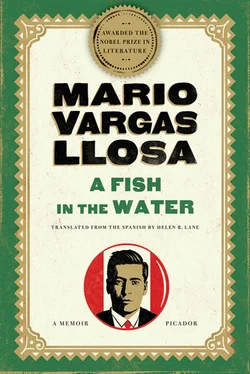Mario Vargas Llosa - A Fish in the Water - A Memoir
Здесь есть возможность читать онлайн «Mario Vargas Llosa - A Fish in the Water - A Memoir» весь текст электронной книги совершенно бесплатно (целиком полную версию без сокращений). В некоторых случаях можно слушать аудио, скачать через торрент в формате fb2 и присутствует краткое содержание. Год выпуска: 2015, Издательство: Macmillan, Жанр: Биографии и Мемуары, на английском языке. Описание произведения, (предисловие) а так же отзывы посетителей доступны на портале библиотеки ЛибКат.
- Название:A Fish in the Water: A Memoir
- Автор:
- Издательство:Macmillan
- Жанр:
- Год:2015
- ISBN:нет данных
- Рейтинг книги:3 / 5. Голосов: 1
-
Избранное:Добавить в избранное
- Отзывы:
-
Ваша оценка:
- 60
- 1
- 2
- 3
- 4
- 5
A Fish in the Water: A Memoir: краткое содержание, описание и аннотация
Предлагаем к чтению аннотацию, описание, краткое содержание или предисловие (зависит от того, что написал сам автор книги «A Fish in the Water: A Memoir»). Если вы не нашли необходимую информацию о книге — напишите в комментариях, мы постараемся отыскать её.
is a twofold book: a memoir of one of Latin America's most celebrated witers, beginning with his birth in 1936 in Arequipa, Peru; and the story of his organization of the reform movement which culminated in his bid for the Peruvian presidency in 1990.
A Fish in the Water: A Memoir — читать онлайн бесплатно полную книгу (весь текст) целиком
Ниже представлен текст книги, разбитый по страницам. Система сохранения места последней прочитанной страницы, позволяет с удобством читать онлайн бесплатно книгу «A Fish in the Water: A Memoir», без необходимости каждый раз заново искать на чём Вы остановились. Поставьте закладку, и сможете в любой момент перейти на страницу, на которой закончили чтение.
Интервал:
Закладка:
At the Yapatera hacienda, belonging to the Checas, I rode horseback for the first time and heard England spoken of in a rather mythical way, since my friend James MacDonald’s father was British, and both he and his wife — Pepita Checa — revered that country, which they had more or less reproduced in those arid reaches of the highlands of Piura (at their house at the hacienda five o’clock tea was served and the conversation was in English).
That year in Piura that was to end on the Eguiguren embankment with the revelation concerning my father lingers in my memory like a jigsaw puzzle: vivid, isolated, exciting images. The young Civil Guard who kept watch over the back door of the prefecture and made Domitila, one of the housemaids, fall in love with him by serenading her with the song Muñequita linda , in a voice filled with exaggeratedly heartfelt feeling, and the excursions with a bunch of my schoolmates along the dry riverbed and the sand pits of Castilla and Catacaos to watch the prehistoric iguanas or see the donkeys fornicating, hidden among the carob trees. The dips in the swimming pool of the Club Grau, our efforts to sneak into the films for grownups at the Variedades movie theater and the Municipal, and the expeditions, which filled us with excitement and guilt-ridden consciences, to spy from the shadows on that green house, the Casa Verde, built in the open countryside separating Castilla from Catacaos, concerning which myths redolent of sin circulated. The word puta , whore, filled me at one and the same time with horror and fascination. Going to post myself in the vicinity of that building, so as to see the wicked women who lived there and their night visitors, was an irresistible temptation, though I knew full well that I was committing a mortal sin and I would be obliged to go to confession afterward to reveal it.
And the stamps that I began to collect, spurred on by the collection that my Grandpa Pedro had — a collection of rare postage stamps, triangular, multicolored, from exotic countries and in exotic languages, that my great-grandfather Belisario had collected and the two volumes of which were one of the treasures that the Llosa family had lugged all over the world — which he allowed me to look through if I’d been a good boy. The parish priest of the Plaza Merino, Father García, an aged, grouchy man from Spain, was also a stamp collector and I used to come to exchange duplicate stamps with him, in bargaining sessions that sometimes ended with one of those fits of rage of his that my friends and I took great delight in arousing. The other family keepsake was the Opera Book that Granny Carmen had inherited from her parents, a lovely old illustrated volume with red and gold backings, which contained the plots of all the great Italian operas and some of their main arias, and which I spent hours reading and rereading.
The gusty winds of local politics in Piura — where the political forces were more in equilibrium than they were in the rest of the country — touched me only in a confused way. The bad guys were the members of the APRA party, who had betrayed “Uncle José Luis” and were making life impossible for him there in Lima; the leader of APRA, Víctor Raúl de la Torre, had attacked my grandfather in a speech, there in Piura in the Plaza de Armas, the main square, accusing him of being a “prefect who was against the APRA.” (I went in secret to have a look at that APRA demonstration, despite my family’s having forbidden me to do so, and I discovered my schoolmate Javier Silva Ruete, whose father was a dyed-in-the-wool Aprista, waving a placard bigger than he was that read: “Maestro, young people acclaim you.”) But despite all the evils that the APRA embodied, there were, in Piura, a few decent Apristas, friends of my grandparents and my aunts and uncles, men like Jaime’s father, Dr. Máximo Silva, Dr. Guillermo Gulman, and Dr. Iparraguirre, our family dentist, with whose son we organized evening theatrical performances in the entry hall of his house.
The mortal enemies of the Apristas were the Urristas of the Unión Revolucionaria (the Revolutionary Union), headed by the Piuran Luis A. Florez, whose bastion was the district of La Mangachería, celebrated for its chicherías , which sold the cheap fermented chicha that is the drink of the poor, along with its picanterías , where highly spiced dishes were served, and its music. Legend had it that General Sánchez Cerro — the dictator who was the founder of the UR, the Unión Revolucionaria, and who was murdered by an Aprista on April 30, 1933—had been born in La Mangachería and because of that all the people of the district were Urristas, and all the huts made of adobe and wild cane in this district of dirt streets and churres and piajenos (the words for children and donkeys in Piuran slang) displayed on their walls a faded image of Sánchez Cerro. Besides the urristas, there were the Socialists, whose leader, Luciano Castillo, was also a Piuran. The street fights between Apristas, Urristas, and Socialists were frequent, and I was aware of it because in those days — when a street demonstration often turned into fisticuffs — I wasn’t allowed to go out of the house and more police came to guard the prefecture, which at times did not prevent the Aprista hoodlums, once their demonstration was over, to creep as close as they could to throw stones at our windows.
I felt very proud to be the grandson of somebody so important: the prefect. I went with Grandpa to certain public functions — inaugurations, the parade on national holidays, ceremonies at the Grau barracks — and was puffed up with pride when I saw him presiding over the meetings, receiving the salutes of the military, or delivering speeches. With all the lunches and public ceremonies he had to attend, Grandfather Pedro had found an excuse for the avocation he had always had and which he encouraged in his oldest grandson: composing poems. He did so with the greatest of ease, on the slightest pretext, and when it came his turn to speak, at banquets and official functions, he often read verses written for the occasion.
Only thirty or forty years later did I learn about the two things that were to decide my future life and that occurred in that year of 1946. The first of them was a letter that my mother received one day from Orieli, my father’s sister-in-law. She had read in the newspapers that my grandfather was prefect of Piura and presumed that Dorita was with him. What had her life been like? Had she remarried? And how was Ernesto’s young son? She had written the letter following instructions from my father, who, driving in his car to his office, had heard on the radio news of the appointment of Don Pedro J. Llosa Bustamante as prefect of Piura.
The second was a trip of a few weeks that my mama had made to Lima, in August, for a minor operation. She telephoned Orieli, who invited her to come have tea with her. On entering the little house in Magdalena del Mar where Orieli and Uncle César lived, she spied my father, in the living room. She fell into a faint. They had to pick her up off the floor, stretch her out in an armchair, bring her to with smelling salts. Seeing him for a moment was enough for those five and a half hellish months of her marriage and her abandonment and the eleven years of silence on the part of Ernesto J. Vargas to be erased from her memory.
No one in the family learned about that meeting or about the secret reconciliation or the epistolary conspiracy that went on for several months, setting up the ambush that had already begun to take place that afternoon, on the Eguiguren embankment, beneath the bright sun of early summer. Why didn’t my mother tell her parents and her brothers that she had seen my father? Why didn’t she tell them what she was going to do? Was it because she knew that they would have tried to dissuade her and would have predicted what awaited her?
Читать дальшеИнтервал:
Закладка:
Похожие книги на «A Fish in the Water: A Memoir»
Представляем Вашему вниманию похожие книги на «A Fish in the Water: A Memoir» списком для выбора. Мы отобрали схожую по названию и смыслу литературу в надежде предоставить читателям больше вариантов отыскать новые, интересные, ещё непрочитанные произведения.
Обсуждение, отзывы о книге «A Fish in the Water: A Memoir» и просто собственные мнения читателей. Оставьте ваши комментарии, напишите, что Вы думаете о произведении, его смысле или главных героях. Укажите что конкретно понравилось, а что нет, и почему Вы так считаете.












